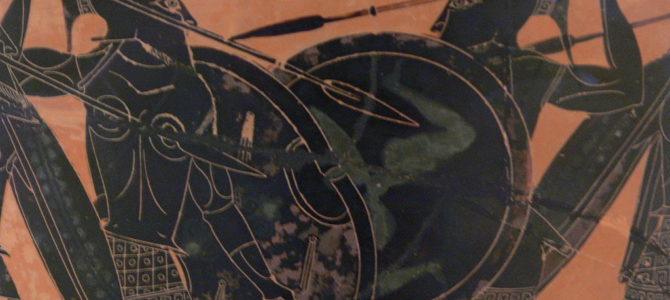
In the fifth lecture of Hillsdale College’s course on the histories of Athens and Sparta, which you can follow along with me here, Victor Davis Hanson, a history fellow at Hillsdale College, explains ancient Athens’ role in fending off the invading Persians.
Recently, I recounted how Sparta’s leadership saved ancient Greece and Western Civilization from conquest during the rise of the Persian Empire. This article will break down how Athens’s involvement was a crucial component in the Greek victory over the Persians.
Athens Before The Persian Wars
The world was being divided into two factions, east and west, with their respective differences in ideas and culture, which entered the Greek vernacular around 550 B.C. In the several hundred years leading up to the (somewhat) inevitable conflicts between east and west, which culminated in the Persian Wars, the Greeks grew arrogant due to their economic success, which exceeded what one might expect from such a geographically small region. Because they were largely untouched by invading forces, the Greeks were able to develop technologies and agricultural techniques, and make significant advances in philosophy, music, literature, and the sciences.
Victory At Marathon
When the Persian forces arrived amongst unsuspecting Athenians during the battle at Marathon in 490 B.C., many of the natives had never seen a Persian before and were overwhelmed by the 30,000 Persian troops encamped on Athenian soil.
Only about 11,000 Greek Hoplite troops faced the massive Persian army. To maximize the lesser number of troops’ impact in fighting the Persians, the Greeks doubled the amount of troops along the perimeter of the formation and thinned out the number of troops in the center. Their heavy armor enabled the Greeks to surround the Persian troops and kill more than 6,000 people in the invading army, but only lose a few more than 100 Hoplite troops.
These heavy casualties pushed the Persians to flee to their ships and leave. When the allied Spartans arrived a day later, they feasted with the Athenians in celebration of their great victory and marveled at the massive pile of Persian corpses. But this significant defeat spurred a later Persian king, Xerxes, to seek revenge upon the Greeks.
Athens After Marathon
The Athenian politician and general Themistocles pushed his people to mine great amounts of silver in order to fund the construction of a massive navy to protect the Athenians from another Persian invasion. The Greeks pointed to the Battle at Marathon as evidence that the Hoplites — free Greek citizens who fought to defend their homeland — were sufficient at beating back invading forces. But Themistocles knew their opponents would return with heavier artillery and a massive fleet of ships.
The great expansion of the navy would do much to change the political and societal landscape in Athens. The growing need for rowers to propel these great, new ships gave those without land an opportunity to participate in the Greek armed forces and gain respect among their fellow citizens.
Clashes With Persian Invaders Continue
As it turns out, Themistocles’s prediction that the Persians would return and be a much more formidable opponent was correct. The Persians once again invaded Greece in 480 B.C., this time at a narrow, coastal pass known as “the hot gates,” or Thermopylae. When the Greeks learned of the Persian invaders, a coalition of Greek soldiers from various city-states, led by King Leonidas of Sparta, took up arms and planned to defend the pass as well as fend off Persian ships invading from the sea.
Leonidas took a faction of 300 soldiers to guard the pass from the invading army of approximately 100,000 Persian troops, knowing they would fight to the death to buy Greek forces elsewhere some time against the Persians. They fought bravely, and their story has inspired numerous legends, books, and movies throughout two millennia. (You can read more about Sparta’s role in leading the coalition of Greek city-states in opposition to invaders in my article here.)
Sadly, the Greeks lost this battle after a fellow Greek betrayed them by telling the Persians about a narrow pass that would allow them to circumvent the resistance. Leonidas, realizing that they were overrun, dismissed most of his troops, ordering them to flee and warn the Athenians to evacuate the city. The entire population of Athens fled the city to the island of Salamis, where they fought and won a battle against the Persians.
Themistocles convinced the Spartans to join the Athenians to fight and ultimately crush the Persians at the Battle of Plataea in 479 B.C. The Persian troops who were not slaughtered were forced to make their way back home on foot. The Greek cities that once claimed to be loyal to the invading Persians the year before did not assist the Persian troops in their journey back home. Very few Persian troops survived the journey, as most succumbed to starvation or disease.
After the defeat of the Persian invaders, tensions between Greek city states escalated. These differences would come to a head in the Peloponnesian War a few decades later.









